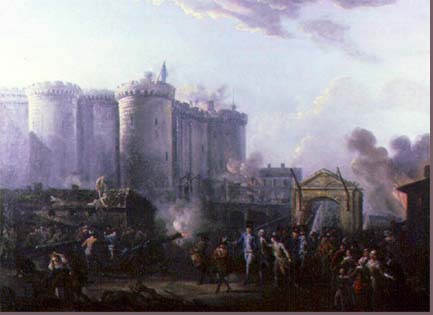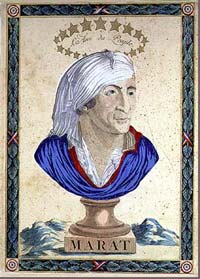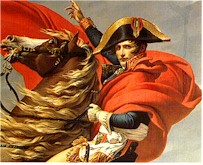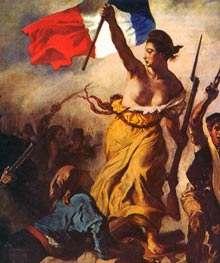 The French Revolution began in 1789 with the meeting of the States General in May. On July 14 of that same year, the Bastille was stormed: in October, Louis XVI and the Royal Family were removed from Versailles to Paris. The King attempted, unsuccessfully, to flee Paris for Varennes in June 1791. A Legislative Assembly sat from October 1791 until September 1792, when, in the face of the advance of the allied armies of Austria, Holland, Prussia, and Sardinia, it was replaced by the National Convention, which proclaimed the Republic. The King was brought to trial in December of 1792, and executed on January 21, 1793. In January of 1793 the revolutionary government declared war on Britain, a war for world dominion which had been carried on, with short intermissions, since the beginning of the reign of William and Mary, and which would continue for another twenty-two years.
The French Revolution began in 1789 with the meeting of the States General in May. On July 14 of that same year, the Bastille was stormed: in October, Louis XVI and the Royal Family were removed from Versailles to Paris. The King attempted, unsuccessfully, to flee Paris for Varennes in June 1791. A Legislative Assembly sat from October 1791 until September 1792, when, in the face of the advance of the allied armies of Austria, Holland, Prussia, and Sardinia, it was replaced by the National Convention, which proclaimed the Republic. The King was brought to trial in December of 1792, and executed on January 21, 1793. In January of 1793 the revolutionary government declared war on Britain, a war for world dominion which had been carried on, with short intermissions, since the beginning of the reign of William and Mary, and which would continue for another twenty-two years.
 The Committee of Public Safety and the Revolutionary Tribunal were instituted immediately after the execution of the King. The Reign of Terror, during which the ruling faction ruthlessly exterminated all potential enemies, of whatever sex, age, or condition, began in September of 1793 and lasted until the fall of Robespierre on July 27, 1794: during the last six weeks of the Terror alone (the period known as the "Red Terror") nearly fourteen hundred people were guillotined in Paris alone. The Convention was replaced in October of 1795 with the Directory, which was replaced in turn, in 1799, by the Consulate. Napoleon Buonaparte became Emperor in May of 1804.
The Committee of Public Safety and the Revolutionary Tribunal were instituted immediately after the execution of the King. The Reign of Terror, during which the ruling faction ruthlessly exterminated all potential enemies, of whatever sex, age, or condition, began in September of 1793 and lasted until the fall of Robespierre on July 27, 1794: during the last six weeks of the Terror alone (the period known as the "Red Terror") nearly fourteen hundred people were guillotined in Paris alone. The Convention was replaced in October of 1795 with the Directory, which was replaced in turn, in 1799, by the Consulate. Napoleon Buonaparte became Emperor in May of 1804.
 The French Revolution was not only a crucial event considered in the context of Western history, but was also, perhaps the single most crucial influence on British intellectual, philosophical, and political life in the nineteenth century. In its early stages it portrayed itself as a triumph of the forces of reason over those of superstition and privilege, and as such it was welcomed not only by English radicals like Thomas Paine and William Godwin and William Blake, who, characteristically, saw it as a symbolic act which presaged the return of humanity to the state of perfection from which it had fallen away--but by many liberals as well, and by some who saw it, with its declared emphasis on "Liberty, Equality, and Fraternity," as being analgous to the Glorious Revolution of 1688: as it descended into the madness of the Reign of Terror, however, many who had initially greeted it with enthusiasm--Wordsworth and Coleridge, for example, who came to regard their early support as, in Coleridge's words, a "sqeaking baby trumpet of sedition"--had second thoughts.
The French Revolution was not only a crucial event considered in the context of Western history, but was also, perhaps the single most crucial influence on British intellectual, philosophical, and political life in the nineteenth century. In its early stages it portrayed itself as a triumph of the forces of reason over those of superstition and privilege, and as such it was welcomed not only by English radicals like Thomas Paine and William Godwin and William Blake, who, characteristically, saw it as a symbolic act which presaged the return of humanity to the state of perfection from which it had fallen away--but by many liberals as well, and by some who saw it, with its declared emphasis on "Liberty, Equality, and Fraternity," as being analgous to the Glorious Revolution of 1688: as it descended into the madness of the Reign of Terror, however, many who had initially greeted it with enthusiasm--Wordsworth and Coleridge, for example, who came to regard their early support as, in Coleridge's words, a "sqeaking baby trumpet of sedition"--had second thoughts.
 The old regime in England, on the other hand, had from the first allied itself closely with Locke and Newton, those great advocates of reason and order, and Edmund Burke could denounce the Revolution in 1790 in his great Reflections on the Revolution in France, elegantly bound copies of which George III, who was not renowned for his intellect, gave to all his frinds, saying that it was a book "which every gentleman ought to read." Burke maintained that the radicals who had begun the Revolution by releasing the enormous pent-up quasi-religious energies of the common people of France were interested first in the conquest of their own country and then in the conquest of Europe and of the the rest of the world, which would be "liberated" whether it wished to be or not. Tom Paine's great response to Burke's work, The Rights of Man, appeared in 1791, and the debate between conservatives and radicals raged on for many years, and certainly influenced, directly or indirectly, the thought and the work of every major English author for the remainder of the century and beyond.
The old regime in England, on the other hand, had from the first allied itself closely with Locke and Newton, those great advocates of reason and order, and Edmund Burke could denounce the Revolution in 1790 in his great Reflections on the Revolution in France, elegantly bound copies of which George III, who was not renowned for his intellect, gave to all his frinds, saying that it was a book "which every gentleman ought to read." Burke maintained that the radicals who had begun the Revolution by releasing the enormous pent-up quasi-religious energies of the common people of France were interested first in the conquest of their own country and then in the conquest of Europe and of the the rest of the world, which would be "liberated" whether it wished to be or not. Tom Paine's great response to Burke's work, The Rights of Man, appeared in 1791, and the debate between conservatives and radicals raged on for many years, and certainly influenced, directly or indirectly, the thought and the work of every major English author for the remainder of the century and beyond.

|













 View fascinating movies about France
View fascinating movies about France 



